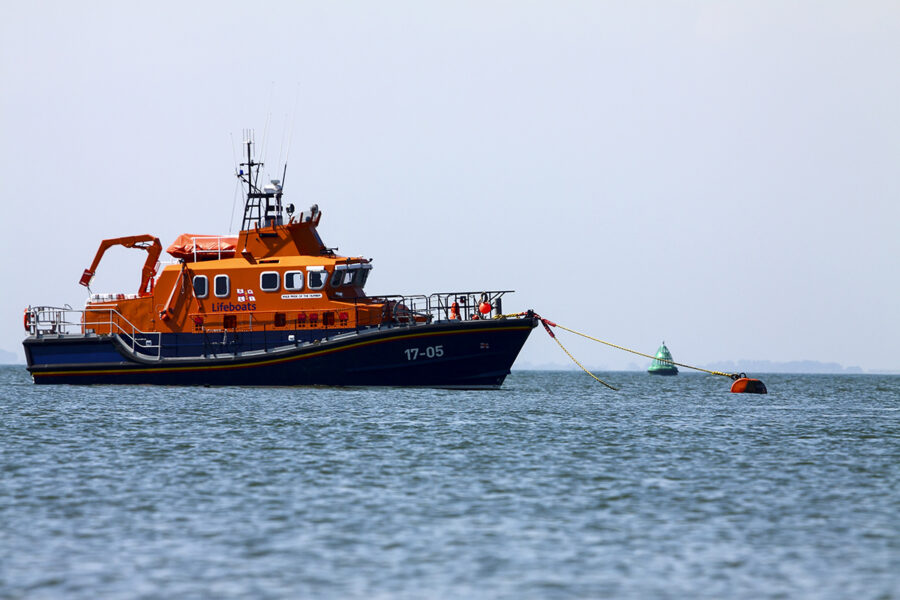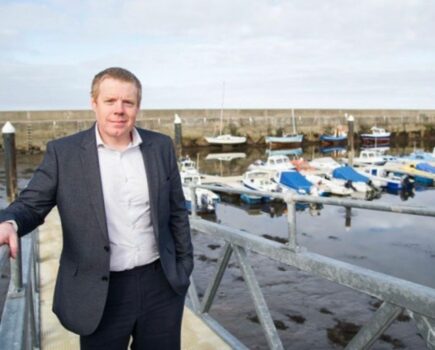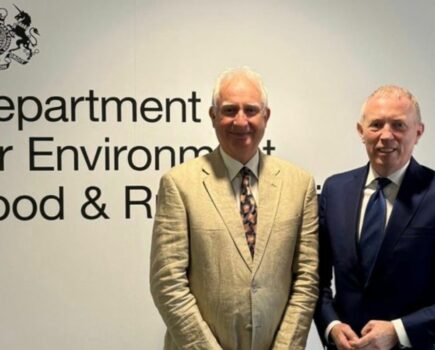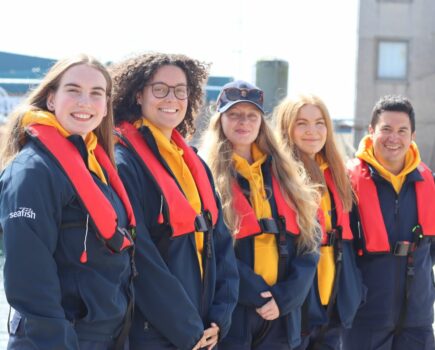MPs ask minister to review Coastguard operations.
Calls are growing for a review of MCA Search and Rescue operations, amid concerns that delays in launching lifeboats are costing fishermen’s lives.
Two experienced lifeboat helmsmen voiced their concerns following the recent sinking of the Solstice off Plymouth with the loss of one life. They say poor operating procedures and a shortage of experienced staff in the Coastguard service are creating delays in responding to emergencies, and may be putting lives at risk.
Clive Palfrey and Dave Milford, the helms of the Looe and Plymouth lifeboats respectively, told Oceans correspondent Ben Webster of The Times of their frustration at the delays in launching their lifeboats. They said they had heard from colleagues and over the radio that Solstice was long overdue, and called the Coastguard to offer help after an hour had passed with no instruction from the MCA to launch, which is the normal launch procedure. Both then decided to self-launch.
Dave Milford, a lifeboatman for 30 years, claimed a Coastguard officer initially argued against the launching. Clive Palfrey, a lifeboatman for 17 years, said there sometimes appeared to be a reluctance to launch a lifeboat.
The MCA carried out a controversial far-reaching update of the Coastguard in 2010, that saw nine of its 19 stations close, a reduction of officers, and increased automation of procedures. Critics argued it would leave stations understaffed and lead to a loss of vital local knowledge.
The Times article highlighted growing concerns about the Coastguard network and the delays in tasking SAR assets, to include RNLI lifeboats, since the MCA modernisation programme was rolled out.
The Solstice sinking was the third incident involving loss of life in the past two years where there was a delay in launching lifeboats – the loss of the scalloper JMT off Plymouth and the sinking of the vivier-crabber Louisa in Mingulay Bay in the Western Isles were the others.
Two of the Solstice’s crew were rescued after six hours on the overturned hull of the vessel in the early hours of 27 September (Fishing News, 5 October). The sea state was calm, and they were lucky.
No distress signal was received from the Solstice, and the MCA said it needed to gather information on the vessel’s position before launching lifeboats to unknown areas.
Local fishermen’s campaigner Terri Portmann has launched an online petition calling for the MCA to be required to send launch requests to the RNLI when fishing boats are overdue. In the first few days, the petition, which can be viewed here, attracted over 1,000 signatures.
Luke Pollard, Labour MP for Plymouth Sutton and Devonport, and a member of the Commons Select Committee on Transport, said: “As the local MP for the Solstice and Plymouth’s fishing industry, I have serious concerns about the effectiveness of the Coastguard.
“It seems clear to those who work in fishing that the Coastguard’s modernisation programme has not worked. Fewer experienced staff, complex new IT systems, and protocols could be delaying launches and putting lives at risk.
“I want to see an urgent review of the Coastguard’s modernisation programme, and response to the sinking of the Solstice, in particular. The loss of local knowledge, new systems, and new protocols must be investigated fully.
“Everyone at sea must have faith that the Coastguard’s systems are top-notch, with sufficient staffing with good knowledge of how fishing works.
“I have had the opportunity to meet and speak with the Maritime Minister John Hayes this week, and ask questions in Parliament. I am happy with his assurances that where improvements can be made they will be, and that he is treating this matter with the urgency and importance it deserves.
“I have asked the Minister for a briefing with the MCA on their systems and protocols, and will continue to work with stakeholders to help make any and all changes that will assist our amazing rescue services in getting to incidents more quickly and recovering more survivors.”
Angus Brendan MacNeil, MP for the Western Isles, said: “Lifeboat men tell me that they would rather a false call 10 times than be too late for a real call once.
“I am hoping that the Coastguard takes action to ensure that delays, as we have seen around the UK coastline, come to an end. The checks prior to tasking a lifeboat – which can be lengthy, compared to the urgency of a situation – can lead to people being left in cold water while waiting for a lifeboat that has yet to be tasked despite the alarm being raised.
“In addition to raising the matter in the House of Commons, I had a meeting with the Maritime Minister John Hayes, when he assured me he is ‘all over this like a rash’, and that he will be investigating further.
“After this frank meeting with the minister, I am heartened that he is serious about this and understands the gravity of the issue. We are of one mind that things must improve.”
In answer to questions raised by MPs Luke Pollard and Angus MacNeil in Parliament on Thursday, 19 October, the Maritime Minister John Hayes said: “I have spoken to the chief inspector of the Marine Accident Investigation Branch and asked him for his view, as quickly as possible, on this issue. In respect of looking at these matters with assiduity, we will leave no stone unturned. If there can be improvements, there will be improvements.”
Terri Portmann says things must change. “Wives, partners, and families of fishermen are not prone to dramatics; they are all too aware of the risks involved with their loved ones’ jobs.
“When these people call 999 and say a boat is overdue, that should be enough to immediately task the RNLI and, where appropriate, other SAR assets. If the Coastguard protocols don’t instruct them to do that, they must be changed as a matter of urgency.
“This was a 10m trawler out of Plymouth; he would be somewhere between the harbour, the Eddystone, and east towards Brixham. If those on duty that night in the Coastguard network did not know that, they should have.
“The loss of local knowledge was one of the main risks that industry highlighted when they fought against the closures of Brixham, other stations, and reductions in staff – we were promised that this would not happen.
“I have no doubt that the hard-working staff in the Coastguard Operations Centre (CGOC) network go to work each day to do their best and help people who find themselves in difficulty. But something is not working here as well as it used to, and we need to make sure that the network, and the staff manning it, have all the support they need to include vital experience and local knowledge to draw on, as well as the best tools to do the job.”
*The Solstice incident is currently under investigation by the Marine Accident Investigation Branch (MAIB). Not all of the circumstances surrounding this tragedy are yet known or can be discussed in the public domain until this investigation is complete.
MCA: ‘Focused efforts’
Julie-Anne Wood, head of maritime operations for HM Coastguard said: “Every search plan is unique, and takes into consideration the tidal and weather conditions, the search target, their drift characteristics, the search units available, and their capabilities.
“The endurance of our search assets is finite. As a result, HM Coastguard’s procedures, which are in accordance with international best practice, ensure that sufficient information is gathered so that rescue units are tasked to the correct area, to maximise their finite endurance and, therefore, the survivability of the casualty.”
“Sadly, in the case of the Solstice, we had not received any distress signals or alerts confirming their exact location, and it was imperative that we narrowed down a search area before we sent vessels and helicopters into the open sea. As soon as we were notified that the Solstice was overdue, we issued a Pan Pan broadcast asking all vessels in the area to contact the Coastguard if they’d seen the Solstice. Using local information, and the information received from these broadcasts, we were able to prepare a targeted search area of 150 square miles, which is the equivalent of 96,000 football fields. Throughout this incident, the search plan was continually updated and narrowed down as further information was received.
“By focusing our efforts, we maximised the probability of successfully finding casualties alive, and subsequently the helicopter found the vessel in HM Coastguard’s refined search plan and was able to direct the lifeboats to its exact location.”
RNLI: Discussions ongoing
RNLI operations director George Rawlinson said: “We recognise the terrible effects of any tragic incident at sea and the impact this has on families, friends, and the wider community, and our deepest sympathy goes out to all those affected. The RNLI works closely with other organisations, striving to improve maritime safety and prevent loss of life. We are truly grateful for the willingness of crews, and those who support them ashore, to respond to the call for help.
“It is not yet possible for the RNLI to comment on all the circumstances of the tragic loss of the Solstice. The independence of the Marine Accident Investigation Branch has been called in to fully examine the circumstances, understand any underlying causes, and follow up on their findings, in order to prevent similar situations happening again.
“When there is a report of an overdue vessel, be it a fishing vessel, pleasure craft or otherwise, the Coastguard needs to make an assessment on the most appropriate response based on a wide range of factors, meaning the tasking decision can be a complex one. If there is limited information, requesting a lifeboat immediately may not be the best course of action, and the pre-planning of a specific search area can save time in the long run. If, however, the Coastguard decide there is sufficient information available then they will request an immediate launch of a lifeboat.
“The RNLI works very closely with the Coastguard, both during and after incidents. When questions or concerns are raised by our staff or volunteer crewmembers, these are discussed with our Coastguard colleagues via formal, very well-established channels. Rescue operations are routinely and regularly reviewed as well and, as a result of our follow-up discussions, any changes needed to our procedures are then put in place.
“With regards to the incident of MFV Solstice, it is important that follow-up investigations by the MAIB, and our own follow-up work with the Coastguard, are allowed to run their course, and the full facts found before any firm conclusions are made.”
Catalogue of faults in Louisa report
An MAIB report published this summer into the sinking in Mingulay Bay of the crabber Louisa, with the tragic loss of three lives, highlighted a number of key issues with the CGOC network including:
- A 42-minute delay in launching the Barra lifeboat.
- Senior officers on break and the network being led by someone with less than three months’ working for the Coastguard.
- A computer system that would not take automatic loading of EPIRB coordinate data and that was prone to screen freeze and required rebooting – a problem that the MCA had been aware of for 18 months.
- The back-up fax in Falmouth CGOC being broken for over a week.
- The failure to learn lessons from the earlier MAIB report into the loss of the North Shields-based trawler Ocean Way FR 349, which recognised the importance of the CGOC using the MMO/Marine Scotland VMS system to locate a vessel when unsure where it may be.
Read more from Fishing News here.








